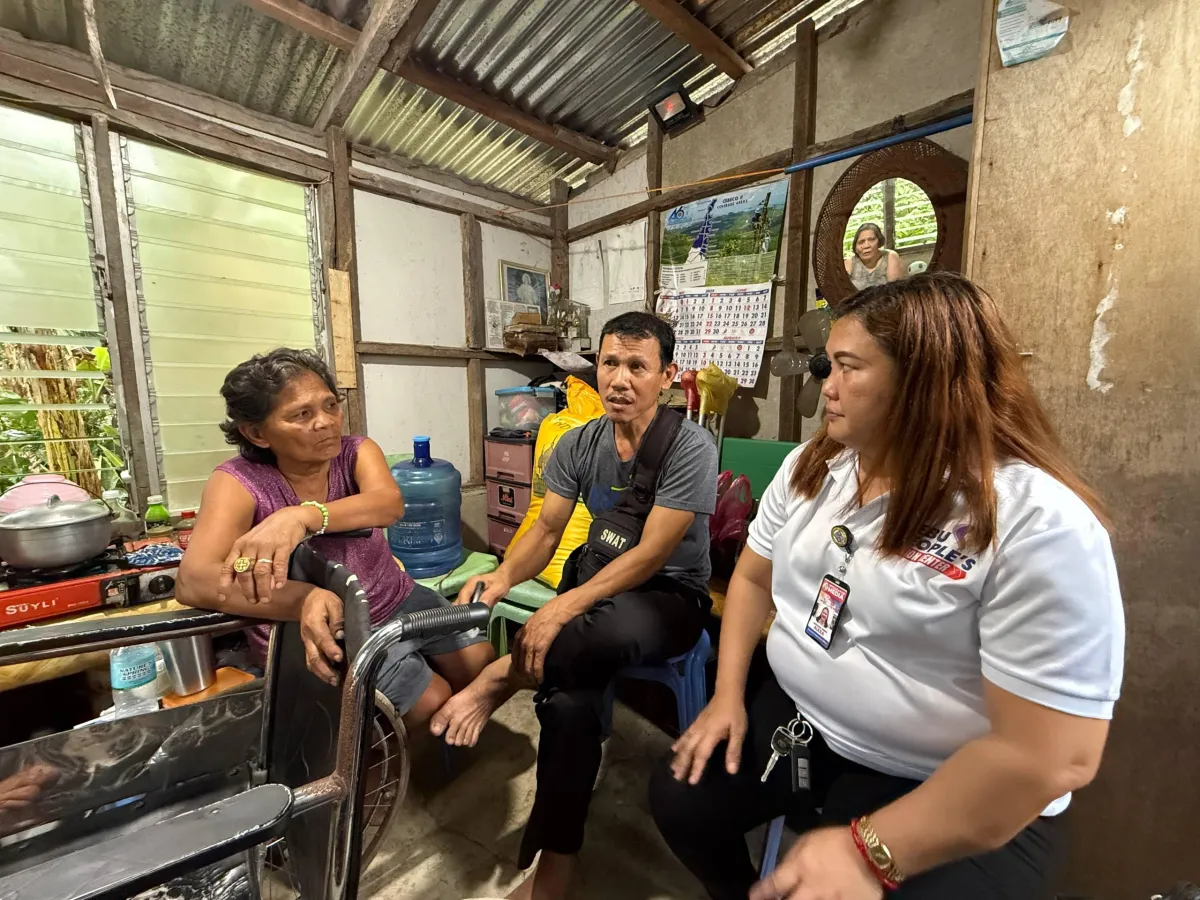
CPAC Reaches Out to Senior Citizen in Danao City Battling Painful Foot Condition
Livelihood Aid and Surgery Coordination Highlight CPAC’s Commitment to the Elderly and PWDs
Danao City, Cebu – In the quiet barangay of Cambanay, a modest home became the center of attention this week as the Cebu People’s Action Center (CPAC) team arrived to visit 72-year-old Lola Guillerma, a senior citizen and person with disability (PWD) living alone. Their mission was twofold: to extend much-needed livelihood assistance and to coordinate urgent medical intervention for a lingering health issue that has been causing her prolonged pain and risk of infection.
Lola Guillerma’s story came to CPAC’s attention during a recent Surgical Screening event in Danao City, part of the government’s ongoing health outreach program. During her check-up, medical personnel discovered that she was suffering from a persistent infection in her foot, directly linked to a stainless implant inserted years ago following an injury.

A Lingering Burden
The stainless implant, meant to restore mobility, had instead become a source of recurring discomfort and a potentially life-threatening infection. Doctors advised its removal to prevent further complications, but for someone like Lola Guillerma—living without a steady income and without close family nearby—such medical procedures often feel out of reach.
According to the World Health Organization, PWDs and elderly individuals in rural and low-income communities are among the most vulnerable to untreated medical conditions, primarily due to financial constraints and limited access to specialized healthcare.
For Lola Guillerma, each day with the implant meant enduring both physical pain and the constant fear of worsening infection. Yet she pressed on quietly, until CPAC’s outreach brought her situation into focus.
Personal Visit and Immediate Aid
Rather than simply noting her case on paper, CPAC took the extra step of visiting her home in Barangay Cambanay. This face-to-face approach allowed the team to see her living conditions firsthand and provide not only words of encouragement but also tangible assistance.
Carrying bags of essential goods, the CPAC team also delivered livelihood support—items and resources designed to help her sustain daily needs while awaiting surgery. This act is part of CPAC’s broader community-based approach, ensuring that aid reaches even the most remote households in Cebu.
The visit was more than a handover of goods—it was a demonstration of the organization’s belief that government services must reach people where they are, especially those unable to travel due to disability or old age.
Health Coordination and Next Steps
Beyond immediate relief, CPAC worked to connect Lola Guillerma with medical professionals who could perform the necessary procedure to remove the stainless implant. Coordination with local health offices and hospitals is ongoing, with priority given to minimizing further health risks.
According to the Department of Health (DOH), untreated infections from orthopedic implants can lead to systemic complications, especially among elderly patients whose immune systems are already compromised. Prompt removal and proper rehabilitation are critical in preventing long-term disability.
CPAC’s intervention aims not only to address the infection but also to restore some measure of mobility and independence for Lola Guillerma, allowing her to move without chronic pain.
Part of a Larger Mission
This initiative is one of many under the leadership of Governor Pam Baricuatro, whose administration has placed strong emphasis on ensuring that social and medical services reach all Cebuanos—particularly the elderly, PWDs, and those in economically disadvantaged situations.
Programs such as mobile health clinics, community livelihood aid, and targeted surgical missions form part of the provincial government’s strategy to close the service gap between urban centers and rural barangays.
The Philippine Statistics Authority reports that nearly 8% of the country’s population are senior citizens, and many live in rural or semi-rural areas where access to specialized medical care is limited. In Cebu, the challenge is compounded by geographic spread, making outreach programs like CPAC’s vital for inclusive healthcare delivery (source).
The Human Side of Governance
Stories like Lola Guillerma’s serve as a reminder that behind every government program are real lives affected—people whose daily struggles are often invisible to the wider public. While statistics and policy frameworks are important, personal connections and follow-through are what make initiatives effective.
For CPAC, visiting homes, listening to stories, and understanding each individual’s circumstances are as important as delivering physical aid. This hands-on approach fosters trust and ensures that assistance is tailored to actual needs rather than generic solutions.
A Community’s Silent Strength
Neighbors in Barangay Cambanay quietly expressed appreciation for CPAC’s visit, noting that such attention to individual cases is rare. For a senior citizen living alone, community and institutional support can make the difference between enduring hardship in isolation and facing it with hope.
Research by the Asian Development Bank highlights that community-based support systems significantly improve the well-being of the elderly and PWDs, especially in rural settings where government resources may take longer to reach.
Looking Forward
As arrangements for Lola Guillerma’s surgery move forward, the focus now shifts to ensuring a smooth recovery process. This will involve follow-up medical care, rehabilitation support, and continued provision of basic needs until she regains full mobility.
CPAC is also encouraging other residents with untreated conditions to participate in upcoming medical screenings, reminding the public that early diagnosis and intervention are key to preventing complications.
Conclusion
The visit to Lola Guillerma is more than a single act of assistance—it is a testament to CPAC’s enduring commitment to reach the most vulnerable sectors of society. By combining immediate relief with long-term health solutions, the organization shows that compassion, when paired with action, can change the trajectory of a person’s life.
In a province as geographically diverse as Cebu, the challenge of service delivery is immense. Yet initiatives like this prove that with dedication and community-centered strategies, no one has to be left behind—whether in bustling city centers or the quiet corners of barangays like Cambanay.
